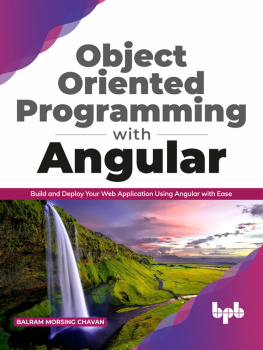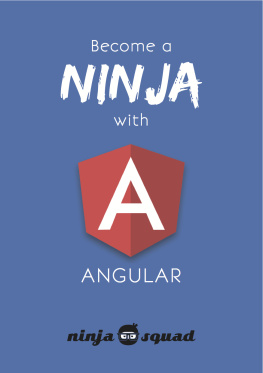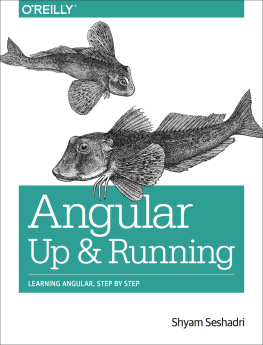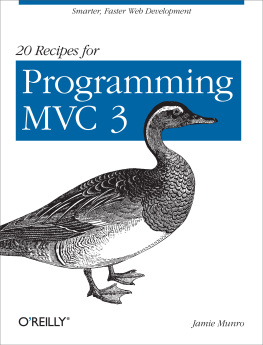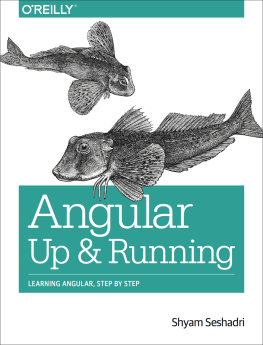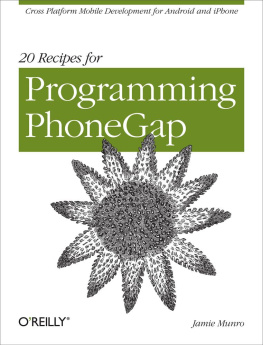Jamie Munro [Munro - 50 Recipes for Programming Angular: Volume 1 (Angular.js Recipes)
Here you can read online Jamie Munro [Munro - 50 Recipes for Programming Angular: Volume 1 (Angular.js Recipes) full text of the book (entire story) in english for free. Download pdf and epub, get meaning, cover and reviews about this ebook. year: 2017, genre: Computer. Description of the work, (preface) as well as reviews are available. Best literature library LitArk.com created for fans of good reading and offers a wide selection of genres:
Romance novel
Science fiction
Adventure
Detective
Science
History
Home and family
Prose
Art
Politics
Computer
Non-fiction
Religion
Business
Children
Humor
Choose a favorite category and find really read worthwhile books. Enjoy immersion in the world of imagination, feel the emotions of the characters or learn something new for yourself, make an fascinating discovery.

- Book:50 Recipes for Programming Angular: Volume 1 (Angular.js Recipes)
- Author:
- Genre:
- Year:2017
- Rating:4 / 5
- Favourites:Add to favourites
- Your mark:
- 80
- 1
- 2
- 3
- 4
- 5
50 Recipes for Programming Angular: Volume 1 (Angular.js Recipes): summary, description and annotation
We offer to read an annotation, description, summary or preface (depends on what the author of the book "50 Recipes for Programming Angular: Volume 1 (Angular.js Recipes)" wrote himself). If you haven't found the necessary information about the book — write in the comments, we will try to find it.
Jamie Munro [Munro: author's other books
Who wrote 50 Recipes for Programming Angular: Volume 1 (Angular.js Recipes)? Find out the surname, the name of the author of the book and a list of all author's works by series.
50 Recipes for Programming Angular: Volume 1 (Angular.js Recipes) — read online for free the complete book (whole text) full work
Below is the text of the book, divided by pages. System saving the place of the last page read, allows you to conveniently read the book "50 Recipes for Programming Angular: Volume 1 (Angular.js Recipes)" online for free, without having to search again every time where you left off. Put a bookmark, and you can go to the page where you finished reading at any time.
Font size:
Interval:
Bookmark:
This book is structured in a Cookbook format featuring recipes that contain problem statements and solutions. A detailed explanation follows each problem statement of the recipe. This is usually contained within the solution; however, an optional discussion section can often contain other useful information helping to demonstrate how the solution works.
To comment or ask technical questions about this book, send an email to:
For thousands of more recipes, visit our online version of the site at Angular.js Recipes.
Find us on Facebook: https://www.facebook.com/Angularjs-Recipes-119861211980524/
Find us on Twitter: https://twitter.com/angular_recipe
I'm comparing these frameworks to do some calculations on the client side. I really liked the example on the angular.js site. I was wondering if any of the backbone.js or knockout.js experts on the site would please recreate that example in their respective frameworks.
Here is the JSFiddle for it.
Code of the Fiddle:
| Qty | Description | Cost | Total | |
|---|---|---|---|---|
| {{item.qty * item.cost | currency}} | [] | |||
| Total: | {{invoice.items.$sum('qty*cost') | currency}} |
Here you go for knockoutjs >
http://jsfiddle.net/neebz/YbwzJ/
I might be biased but it's a lot more structural than angular/backbone.
If you have any questions, let me know.
There are some NaN checks which I think you could take yourself.
Also have a look https://github.com/addyosmani/todomvc which show a standard TODO app written in all popular frameworks.
This content originated from StackOverFlow and has been re-organized into the above recipe.
I have searched for this but did not get proper answer if we can connect couchDB directly with angular.js framework
or
We have to take help of node.js for that.
While I have no experience of angular.js, looking at the Google Buzz example it appears to have a way to deal with JSON-providing resources. Since this is exactly what CouchDB is, I don't think there is any need for node.js to be involved.
All CouchDB functionality can be accessed via HTTP requests, so it should fit right in, if necessary by doing AJAX calls. The angular.service.$resource looks to be the appropriate candidate.
Ashvin, thanks for asking this. I too struggle with this issue.
I have not yet figured out how to use $resource to call the local CouchDB from AngularJS, since it uses a full localhost URL like this:
http://localhost:5984//_all_docsand all of the AngularJS docs and examples show local pathnames. They don't really tell one how to reach out to a separate web service, or at least I haven't found an explanation that helps :)
Here's a way to use jQuery that was easier for me to understand. I placed this in a file named couch.js - to connect to a CouchDB of our critters (dogs, cats, etc). The actual module ("app") is defined elsewhere in the app, so I just put it in a variable named "app" and added a Couch controller like so:
(function () { 'use strict'; var app = angular.module('app'); app.controller('CouchCtrl', function ($scope,$http,$resource) { var all_critters = 'http://localhost:5984/critters/_all_docs?callback=?'; $.getJSON(all_critters, function(json) { $scope.$apply(function(){ $scope.all_critters = json; }); }); $scope.getAllCritters = function() { return $scope.all_critters; }; });}());I added the ?callback=? for JSONP to avoid localhost security issues with the browsers while I worked locally, so I set JSONP = true in the CouchDB preferences.
In an html page, just look at the result of this call by putting crittersDB in a binding:
{{key}} - {{value}}
CrittersThere are currently {{all_critters.total_rows}} critters.
If anyone could post some actual AngularJS $resource code to replicate this jQUery.getJSON way of pulling data from CouchDB into an AngularJS app, I'd appreciate it.
Discussion courtesy of: noogrubThe trick is that your page that includes queries to the couchdb must be served from the same address and port as couchdb itself. This can be accomplished by serving your html by couchdb, or by installing a proxy that would act as umbrella for both your web server hosting the html and couchdb.
Discussion courtesy of: Davorin RuevljanI've created an AngularJS module called CornerCouch that improves on the approach of theAngularJS $resource by tailoring it specifically for CouchDB. It is based on the $http service in AngularJS. I ended up with nice clean JavaScript code that way, especially in the app specific AngularJS controller.
CornerCouch AngularJS Module
Making the calls directly leaves three options, as far as I know:
Load the html app directly from a CouchDB attachement (CouchApp approach)Use a transparent proxy as included in the Jetty project (Java app stack)Access via GET only, but using JSONP, after enabling it on the CouchDB server
Everything else does not get by cross-site scripting restrictions.
Discussion courtesy of: eddelplusI've modified the example on the AngularJS website to use CouchDB instead of mongolab. See the jsfiddle here http://jsfiddle.net/WarwickGrigg/dCCQF/ and github repository here https://github.com/telanova/angularjs-couchdb. I'm an angular newbie: I found it a struggle to get my head round $resource, but it seems to work well.
$scope.projects = ProjectCouch.get({q:'_all_docs', include_docs: 'true', limit: 10});angular.module('CouchDB', ['ngResource']). factory('ProjectCouch', function($resource) { var ProjectCouch = $resource(':protocol//:server/:db/:q/:r/:s/:t', {protocol: 'http:', server: 'localhost:5984', db:'projects'}, {update: {method:'PUT'} } ); ProjectCouch.prototype.update = function(cb) { return ProjectCouch.update({q: this._id}, this, cb); }; ProjectCouch.prototype.destroy = function(cb) { return ProjectCouch.remove({q: this._id, rev: this._rev}, cb); }; return ProjectCouch;});This content originated from StackOverFlow and has been re-organized into the above recipe.
I have the following controller which works fine:
function Controller() {}Controller.prototype = { getResult: function(project) { var that = this; jQuery.ajax({ async: false, url: "/my-service/call?project=" + project, dataType: "json", success: function(data) { that.result = data; } }); }};Font size:
Interval:
Bookmark:
Similar books «50 Recipes for Programming Angular: Volume 1 (Angular.js Recipes)»
Look at similar books to 50 Recipes for Programming Angular: Volume 1 (Angular.js Recipes). We have selected literature similar in name and meaning in the hope of providing readers with more options to find new, interesting, not yet read works.
Discussion, reviews of the book 50 Recipes for Programming Angular: Volume 1 (Angular.js Recipes) and just readers' own opinions. Leave your comments, write what you think about the work, its meaning or the main characters. Specify what exactly you liked and what you didn't like, and why you think so.

